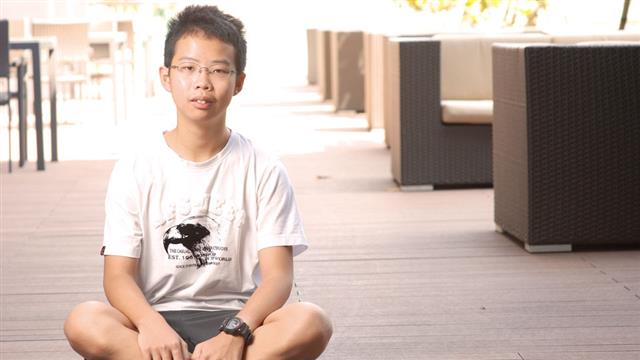Please tell us about your childhood.
I am a native of Beijing but I was born in Nanping in Fujian Province. My father and mother worked in the Chinese Academy of Sciences and the Chinese Academy of Social Sciences, respectively. Soon after my birth, my parents went to work in the US and left me in Fujian. My grandparents took good care of me. When I was about two years old, I moved back to Beijing with my parents. I went to a kindergarten under the National Development and Reform Commission, and then China-Cuba Friendship Primary School. In primary 4, my class teacher encouraged us to apply for the ‘High Ability Class’ of Beijing No. 8 High School. Fortunately, I was accepted after three rounds of exams and a week of trial classes.
In general, students in ‘High Ability Class’ complete an eight-year programme in four years. How did you do that?
The school designed a unique curriculum which greatly enhanced our learning. First, intensive physical training to temper our will power. For instance, three physical education lessons per week, a 2-km run everyday after school, and long distance cycling, etc. Second, extra curricular activities to broaden our horizons. In my case I visited a mine shaft, an oil field and famous colleges overseas. Last but not least, inquiry-based learning to cultivate independent and creative thought.
Did you get stressed out in the ‘High Ability Class’?
Yes, sometimes. Not because of the curriculum but the competition among classmates. Fortunately, our teachers always encouraged us. I liked to play the piano and badminton to reduce stress. My parents were permissive about my grades but they really cared about my studying behaviour. I remember I used to play computer games without their permission and refused to do homework. It worried them.
Do your parents think you are intelligent? How would you rate yourself?
My parents never think that I am clever. In fact they think that I was very slow to react sometimes. They had no expectation when I applied for the ‘High Ability Class’. I think I am able to concentrate on my studies, but people think that is intelligence.
Have you received preferential treatment because of your intelligence?
I don't think so. Whether in high school or in university, classmates and I are treated equally. But maybe because of my age, teachers and classmates in the College and the Faculty, as well as my guardian from the Office of Student Affairs, take really good care of me. I am really thankful to them.
Why did you choose CUHK?
We have an early admission scheme in China that allows us to make our choice before the National Higher Education Entrance Examination. I had done some research and talked to some ‘High Ability Class’ graduates who were studying at CUHK and finally came to a decision on my own. The cultural diversity at CUHK and in Hong Kong provides me with an ideal environment in which to prepare for further studies in the West.
What attracted you to electronic engineering?
I was very interested in mathematics and physics since I was a child. I read A Brief History of Time written by Stephen Hawking at 10. Although I did not really understand the book, I was fascinated by topics like the theory of relativity, the black hole, and time travel. I studied mathematics and information technology in my first year in CUHK, then I switched to electronic engineering—an interdisciplinary subject which integrates knowledge of mathematics, physics, and computer science. Perhaps this decision was inspired by Prof. Lee Tan and my father. I hope I can acquire knowledge and skills during my undergraduate studies, so that I can make contribution to theory and practice in the field, and eventually become an inventor who can change the way human beings are living.
There are a lot of people who are good at studying but weak in self-care skills. What about you?
This is my first time to leave my family. Being a 15-year-old, with no doubt I have less experience compared to classmates who are already adults. When exams and deadlines are coming, I admit that I sometimes forget to wash my clothes, tidy up my room, and shower. A year ago the College arranged some upperclassmen to live with me and teach me how to be independent. I think I am a grown man now.
Do you have any difficulty making new friends?
Most of my friends are from Mainland China. I think if I can speak Cantonese I will make some local friends. I always study and discuss with friends in the Faculty, and I always go out and play games with friends I met in the orientation camp. I have to face two challenges here: first, to adapt to the local environment and make friends with the locals—this is an issue many mainland students encounter; second, to interact with students older than me. I always try to interact with the local students, hoping that I can understand how they think and learn their ways of expression. The College is a great platform for meeting more friends. I also try to identify some common interests with my classmates, disregarding my young age.
What are your future plans?
I still have to figure it out, but I am sure I will follow my dream. I will continue my study overseas or in Hong Kong. I believe wherever I go, hard work is the only key to success. At present I just want to enjoy my life at CUHK.


